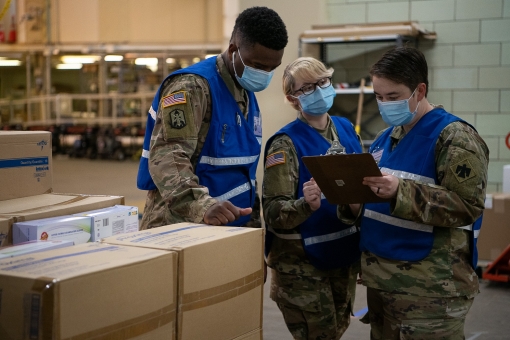|
|
RAND research and commentary on the issues that matter most
|
July 2, 2020
|
|
|
|
|
Photo by Bob London/Alamy
|
|
|
|
As an emergency physician and a RAND researcher, Mahshid Abir knows what hospitals could face if they get hit with a surge of COVID-19 patients. She also knows that hospitals may need help preparing for such a surge.
That's why Abir and her colleagues created a tool that shows how to get the most out of critical care space, staff, and supplies. This is especially important because the next COVID surge could happen anywhere, she says. “New York was the epicenter in the spring; who knows where it will be in the fall and winter? All hospitals need to have surge-capacity plans in place and be ready, because it could be their city.” Read more »
|

|
|
A woman holds a sign at a protest outside Los Angeles Unified School District, June 23, 2020. Photo by Lucy Nicholson/Reuters
|
|
In the wake of numerous police killings of Black Americans, calls to “defund the police” have grown louder. In response, Los Angeles is moving forward with a plan to reallocate $150 million from the LAPD to social supports, such as job programs and health services. RAND research provides some evidence to back up this approach. For example, one study found that a supportive housing program helped people experiencing homelessness achieve high rates of stable housing and low rates of felony re-arrests.
Read more »
|
|

|
|
Photo by Will Dunham/Reuters
|
|
Last week, the Trump administration filed a legal brief asking the Supreme Court to repeal the Affordable Care Act. If the ACA is struck down, then more than 20 million people could lose their health insurance. As the country continues to grapple with the pandemic, the stakes for this decision couldn't be higher. RAND experts say that mass insurance loss could further strain the U.S. health care system, increase community transmission of the coronavirus, and lead to more avoidable deaths.
Read more »
|
|

|
|
NYPD officers stand guard in Central Park during a protest against the killing of George Floyd, June 5, 2020. Photo by Mike Segar/Reuters
|
|
It's estimated that police in the United States killed more than 1,000 people last year. According to RAND experts, addressing this grim statistic may require changes in areas such as recruitment, training, and liability. But perhaps most importantly, it will require transforming the culture of policing, which is too often viewed as “us against them.” That kind of cultural change may be achieved by focusing on the entire system, rather than merely blaming individual officers.
Read more »
|
|

|
|
Members of the Oklahoma National Guard conduct quality checks on medical supply orders, Oklahoma City, April 20, 2020. Photo by Tech. Sgt. Kasey Phipps/OK Air National Guard
|
|
COVID-19 has exposed weaknesses in U.S. pandemic preparedness and response. That's according to a recent congressional testimony by RAND's Daniel Gerstein. Specifically, Gerstein explains shortcomings of the Strategic National Stockpile of drugs, vaccines, and other medical products. Although the stockpile was used in the COVID-19 response, it was never intended to handle a truly national crisis. Fortunately, there are ways to address the problem. For one, public health must be prioritized and funded as a national security issue, he says.
Watch the video »
|
|

|
|
Photo by Prostock-Studio/Getty Images
|
|
Teaching media literacy is one way that schools can help combat the diminishing role of facts in American public life—a trend we at RAND call “Truth Decay.” According to results from our new national survey, teachers and schools across the country are already taking steps to address students' media literacy and use. However, many teachers reported concerns, including how much media students consume and their limited ability to determine whether what they read online is credible.
Read more »
|
|
|
You already get the latest insights from RAND in your inbox. Why not your earbuds?
Policy Currents is available as a weekly podcast. Five minutes, every Friday.
Subscribe now »
|
|
|
|
|